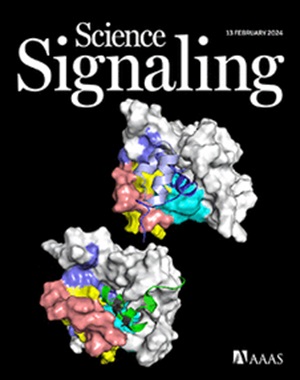Sustained chromosomal passenger complex activity preserves the pluripotency of human embryonic carcinoma cells
IF 6.6
1区 生物学
Q1 BIOCHEMISTRY & MOLECULAR BIOLOGY
Science Signaling
Pub Date : 2025-02-18
引用次数: 0
Abstract
Human embryonic carcinoma (hEC) cells are derived from teratocarcinomas, exhibit robust proliferation, have a high differentiation potential, are the malignant counterparts of human embryonic stem cells (hESCs), and are considered hESC-like. The chromosomal passenger complex (CPC), made up of the microtuble binding protein Borealin, the kinase Aurora-B, the CPC-stabilizing inner centromere protein (INCENP), and the inhibitor of apoptosis family member Survivin, regulates cell division and is active exclusively during mitosis in somatic cells. The anaphase-promoting complex/cyclosome and its cofactor Cdh1 (APC/CCdh1) is a ubiquitylating complex that catalyzes the degradation of Aurora-B and Borealin in somatic cells but has low activity during interphase in hESCs. Here, we found that Borealin and Aurora-B exhibited sustained stability throughout the cell cycle of hEC cells due to low APC/CCdh1 activity. In contrast with somatic cells, CPC activity persisted across the cell cycle of hEC cells because of diminished APC/CCdh1 activity. Disrupting the CPC complex by depleting its constituents triggered spontaneous differentiation in hEC cells. As hEC cells differentiated, APC/CCdh1 activation curtailed CPC activity. Inactivating the CPC by pharmacologically inhibiting Aurora-B induced hEC cell differentiation by activating the epithelial-to-mesenchymal transition (EMT) program. Hence, APC/CCdh1-mediated termination of CPC activity triggered hEC cell differentiation. Collectively, these findings demonstrate a role for the CPC in governing hESC cell fate.
持续的染色体客复合体活性保留了人胚胎癌细胞的多能性
人胚胎癌(hEC)细胞来源于畸胎癌,表现出强大的增殖能力,具有高分化潜力,是人类胚胎干细胞(hESCs)的恶性对应物,被认为是hesc样细胞。染色体乘客复合物(CPC)由微管结合蛋白Borealin、激酶Aurora-B、CPC稳定内着丝粒蛋白(INCENP)和凋亡家族成员Survivin的抑制剂组成,调节细胞分裂,并在体细胞有丝分裂期间唯一活跃。后期促进复合体/环体及其辅助因子Cdh1 (APC/CCdh1)是一种泛素化复合体,在体细胞中催化Aurora-B和Borealin的降解,但在hESCs的间期活性较低。在这里,我们发现由于APC/CCdh1活性较低,Borealin和Aurora-B在hEC细胞的整个细胞周期中表现出持续的稳定性。与体细胞相比,由于APC/CCdh1活性降低,CPC活性在hEC细胞的整个细胞周期中持续存在。通过消耗CPC复合物的成分来破坏CPC复合物可触发hEC细胞的自发分化。随着hEC细胞的分化,APC/CCdh1的激活抑制了CPC的活性。通过激活上皮-间质转化(EMT)程序,从药理学上抑制Aurora-B诱导的hEC细胞分化,使CPC失活。因此,APC/ ccdh1介导的CPC活性终止触发hEC细胞分化。总的来说,这些发现证明了CPC在控制hESC细胞命运中的作用。
本文章由计算机程序翻译,如有差异,请以英文原文为准。
求助全文
约1分钟内获得全文
求助全文
来源期刊

Science Signaling
BIOCHEMISTRY & MOLECULAR BIOLOGY-CELL BIOLOGY
CiteScore
9.50
自引率
0.00%
发文量
148
审稿时长
3-8 weeks
期刊介绍:
"Science Signaling" is a reputable, peer-reviewed journal dedicated to the exploration of cell communication mechanisms, offering a comprehensive view of the intricate processes that govern cellular regulation. This journal, published weekly online by the American Association for the Advancement of Science (AAAS), is a go-to resource for the latest research in cell signaling and its various facets.
The journal's scope encompasses a broad range of topics, including the study of signaling networks, synthetic biology, systems biology, and the application of these findings in drug discovery. It also delves into the computational and modeling aspects of regulatory pathways, providing insights into how cells communicate and respond to their environment.
In addition to publishing full-length articles that report on groundbreaking research, "Science Signaling" also features reviews that synthesize current knowledge in the field, focus articles that highlight specific areas of interest, and editor-written highlights that draw attention to particularly significant studies. This mix of content ensures that the journal serves as a valuable resource for both researchers and professionals looking to stay abreast of the latest advancements in cell communication science.
 求助内容:
求助内容: 应助结果提醒方式:
应助结果提醒方式:


